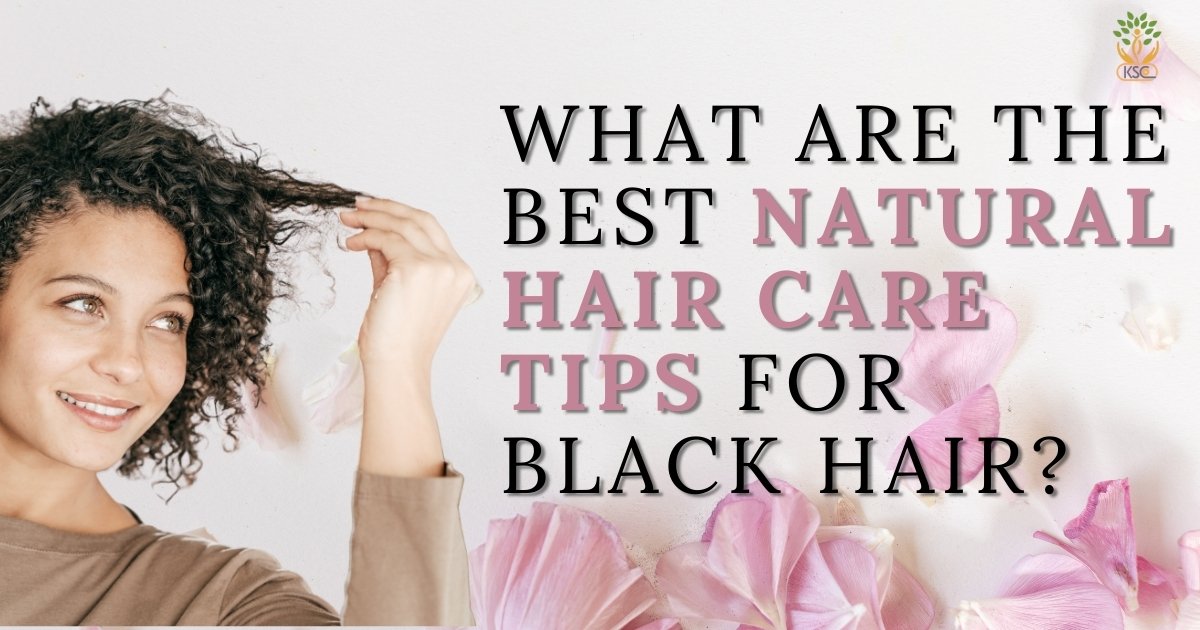When caring for black hair, you must be consistent, keep it moist, and handle it gently. Black hair has unique curl patterns that make it more likely to break, get tangled, and dry out than straight or loosely wavy hair. The most important answer is clear from the first few lines: the best natural hair care advice for black hair is to stay away from harsh chemicals, keep it hydrated, style it in a way that protects it, and care for your scalp. Once you have these basics, you can keep your hair healthy, strong, and beautiful.
Why a Different Approach Is Needed for Black Hair?
Black hair often grows in coils or zigzags with curl patterns that bend tightly. These bends stop the natural oils from the scalp from moving down the hair, which makes it dry. If the hair isn’t properly moisturized, the dryness makes it more likely to break. Also, harsh products, relaxers, and heat styling can strip hair of its natural oils, making it more fragile. Understanding these traits is the first step in creating a hair care routine that protects your hair instead of hurting it.
Moisture is the most essential part of taking care of natural Black hair. Without it, hair breaks easily and gets brittle. The best way to keep moisture is to use oil-based sealing and water-based hydration simultaneously. When you spray water or aloe vera juice on your hair and then put on natural oils like castor, jojoba, or coconut oil, you make a protective layer that keeps water from getting out. Shea butter is another good sealant that keeps hair soft for longer. A leave-in conditioner with natural ingredients can be used every day to add moisture, especially in dry climates.
Reasons to Use Gentle Cleaning
Washing your hair is essential for the health of your scalp, but harsh shampoos strip Black hair of its natural oil. Instead, use shampoos that don’t contain sulfates. They clean without drying out. People with natural hair often choose to co-wash, which means using conditioner instead of shampoo to keep their hair hydrated. Depending on how much buildup you have and how you live, washing every seven to fourteen days is usually enough. Please avoid washing your hair frequently because it dries out and increases the chance for damage.
These treatments make hair more flexible, strengthen and add moisture. Store-bought conditioners often mix these ingredients with more proteins, but you can make your own masks at home with honey, avocado, banana, and olive oil. Put on a shower cap and deep conditioner for at least half an hour for the best results. Following this weekly routine is one of the best ways to keep your skin from getting dry.
By reducing daily manipulation, protective styles helps to hair grow and keep it from damaging. Cornrows, braids, twists, and Bantu knots are all popular options. Wigs and weaves can protect your hair if you wear and care for them correctly. The goal is to keep the ends tucked away while letting the scalp breathe. You shouldn’t keep these styles too long because they could cause tension or buildup. The best time is usually between two and six weeks, depending on the style.
The Impact of Heat on Black Hair Maintenance
Heat can be both helpful and dangerous. Blow dryers, curling irons, and straighteners can hurt natural hair quickly if you use them too much or at high temperatures. Always use a heat protectant spray to keep your hair from getting damaged, and set your tools to the lowest temperature possible. Use natural methods like twist-outs, braid-outs, and roller sets for definition and stretch. Save heat styling for special occasions. Air drying is always gentler than blow drying.
The importance of nighttime routines for hair health is often overlooked. Cotton pillowcases causes dryness by absorbing oils and roughen the hair cuticle. Changing to a silk pillowcases has a noticeable impact. Additionally helpful in retaining moisture and reducing friction are satin scarves and bonnets. Put a little oil on your scalp before bed to keep them moist all night.
Diet contains vitamins and minerals. Black hair benefits from protein for strength, iron for circulation, zinc for repair, and omega-3 fatty acids for hydration. Drinking enough water daily ensures that hair is hydrated from the inside out. Stress management can also affect hair growth because stress hormones can weaken follicles and makes hair to fall.
Things You Shouldn’t Include in Black Hair Products
Not all hair care products are good for Black hair. Instead, look for products with honey, aloe vera, shea butter, plant extracts, and natural oils. Reading the ingredient labels before you buy something is one of the easiest ways to protect the health of your hair.
| Oil | Main Benefit | Best Use |
| Coconut oil | Penetrates strands deeply | Sealing after moisturizing |
| Castor oil | Promotes thickness & growth | Edge care and scalp treatments |
| Argan oil | Adds shine & softness | Leave-in lightweight moisture |
| Olive oil | Strengthens & hydrates | Deep conditioning masks |
The key to success is being consistent. Pick a basic routine for cleansing, moisturizing, conditioning, and protecting your skin, and stick to it. Buying too many things at once often leads to clutter that doesn’t help you. You can see how far you’ve come and what you need to do to improve by keeping a journal or taking pictures of your progress. A simple routine includes natural ingredients and it is done carefully that will always work better than an advanced technique changes products all the time.
Conclusion
For natural black hair care to work, it needs to be kept moist, handled gently, and protected correctly. By focusing on hydration, deep conditioning, protective styling, and making healthy choices, you can help your black hair grow strong and shine. There are a lot of products and routines to choose from, but the best results come from being consistent and knowing what your hair needs. K. Somu Chetty & Co. has been around for a long time and can help you choose safe, natural products and make a hair care plan that works for you.



